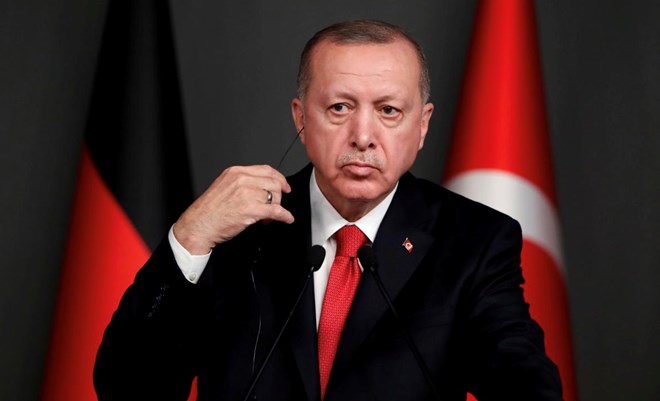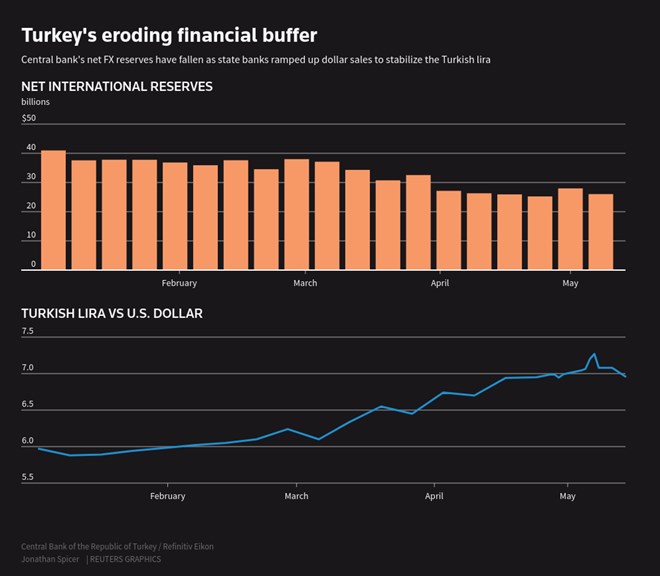
Friday May 15, 2020

Turkish President Tayyip Erdogan attends a joint news conference with German Chancellor Angela Merkel in Istanbul, Turkey, January 24, 2020. REUTERS/Umit Bektas/File Photo
ANKARA (Reuters) - Turkey’s government has appealed to foreign allies in an urgent search for funding, three senior Turkish officials said, as it prepares defences against what analysts fear could be a second currency crisis in as many years.
Treasury and central bank officials have held bilateral talks in recent days with counterparts from Japan and the United Kingdom on setting up currency swap lines, and with Qatar and China on expanding existing facilities, the officials said.
Cevdet Yilmaz, the ruling AK Party’s deputy chairman for foreign affairs, confirmed on Thursday that Turkey was seeking swap agreements.
“We are having negotiations with different central banks for swap opportunities,” he told a panel discussion, adding: “It is not only the U.S., there are also other countries.”He did not give further details.
The push comes after the lira TRYTOM=D3 hit a historic low last week, limiting Ankara's capacity to address concerns over its depleted foreign reserves and hefty debt obligations.
One of the officials told Reuters Turkey was feeling confident after the talks. But it was unclear how close it may be to securing any deals as the coronavirus pandemic stretches governments and central banks like never before.
Turkey’s Treasury ministry, Japan’s finance ministry and the Bank of England declined to comment. The People’s Bank of China did not respond to a faxed request for comment. Qatar’s government media office did not respond to a query about expanding the swaps with Ankara.
If Turkey cannot secure tens of billions of dollars worth of funding, analysts say it risks a currency spiral tmsnrt.rs/2L5ks0o similar to 2018, when the lira briefly shed half its value in a crisis that shook emerging markets.
The government has said its forex buffer is adequate. This week, President Tayyip Erdogan blamed the lira’s fall on “those who think they can destroy our economy, put shackles on our feet, corner us by using financial institutions abroad”.
The diplomatic effort comes as the coronavirus pandemic here is expected to trigger a recession.
It suggests Turkey is looking beyond its preferred source of funding, the U.S. Federal Reserve, and may have to consider tougher decisions on interest rates or options it has dismissed, such as IMF assistance or capital controls, investors say.
“Talks are in a better position especially with Qatar, China and Britain,” said the first senior official, who requested anonymity. “I am optimistic that a certain amount of resources will be provided” and an agreement should “not take too long”.
The two other officials said Turkey reached out to Japanese representatives about possible funding, with one adding that talks need to be speeded up if a swap line is to be secured.
RISKS
The Turkish central bank's net foreign currency reserves tmsnrt.rs/3bOJYmo have dropped to $26 billion from $40 billion this year. Bankers say that was largely due to state lenders selling some $30 billion in FX markets to support the lira, which has nonetheless fallen 15% this year.
GRAPHIC: Turkey's eroding financial buffer - here

The country’s 12-month foreign debt obligations are $168 billion, with about half due by August, while disappearing tourism income has inflated its monthly current account deficit to nearly $5 billion.
“I don’t really see how Turkey can navigate this period, especially considering their external vulnerabilities,” said Shamaila Khan, director of emerging markets debt at AllianceBernstein in New York.
Turkey has underestimated its risks “unfortunately for months now” said Khan, who was among hundreds of investors on a conference call with Finance Minister Berat Albayrak last week.
On the call, Albayrak said reserves are adequate and he was optimistic about negotiating new funding with fellow G20 nations and trade partners, according to participants and a brief ministry summary.
He singled out countries with whom Turkey has large trade deficits and promised an update to existing swap lines, one investor said. Turkey has currency swap facilities worth $1.7 billion with China and $5 billion with Qatar.
The Fed extended dollar swap lines to several countries in March but it appears unlikely to add Turkey despite Ankara’s appeal to Washington, based on comments from current and former officials. The U.S. central bank declined to comment.
A Japanese government official said Tokyo has no plan for now beyond monitoring the lira, but added the Group of Seven (G7) countries or the International Monetary Fund would rescue Turkey “if it morphs into a real crisis.”
CONTINGENCIES
Any significant weakening of the lira beyond 7 per dollar, where it has stabilized, could erode support for Erdogan, whose party lost local elections last year on the heels of the 2018 crisis that sent inflation and unemployment soaring.
GRAPHIC: Turkish lira timeline from 2013 - here
His government has imposed tighter limits on local bank FX trading and opened investigations into global firms UBS, Citigroup and BNP Paribas.
Investors and bankers say it would need to act fast to restore confidence tmsnrt.rs/2L4x3kB if companies begin missing foreign debt payments or Turks start withdrawing deposits.
They say rate hikes are one avenue, followed by IMF funding — an option both Erdogan and Albayrak have dismissed.
“This feels like a rerun of the last lira crisis,” said Win Thin, global head of currency strategy at Brown Brothers Harriman. “Surprisingly little has changed fundamentally in the nearly two years that have passed (except policies) that make it even harder to invest in Turkey.”
Only in a worst-case scenario would Turkey adopt capital controls, such as limits on transfers or withdrawals, which would harm its market credibility, investors and bankers said.
The first Turkish official said some steps were taken to prevent “speculative attacks” on the currency, but that capital controls “are certainly not on the agenda”.